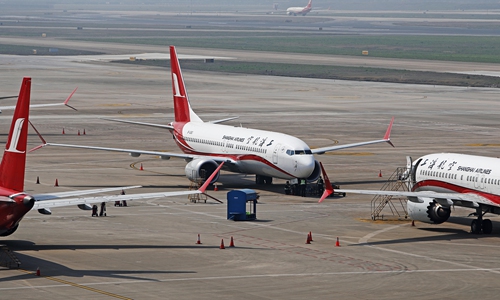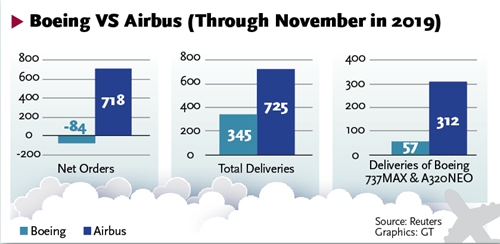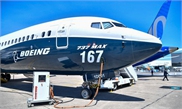Boeing’s tough year under shadow of 737MAX
Deliveries halved in first 11 months of 2019: company

Workers check a Boeing 737 MAX jet at Shanghai Hongqiao International Airport in March. Photo: CNS
Boeing Co delivered less than half as many planes in the first 11 months of 2019 as in the same period a year earlier, the planemaker said on Tuesday, as it continued to struggle with the grounding of its best-selling 737 MAX jets.Deliveries totaled 345 aircrafts in the 11 months that ended November, compared to 704 last year and were also less than half the number delivered by European rival Airbus in the same period.
Customers typically foot the bill for a new jetliner on delivery, making it a crucial metric for the world's big two jetliner producers.
The company did see a boost in orders around last month's Dubai airshow, bringing the number of orders net of cancellations or conversions this year to 56 at the end of November from 45 a month earlier.
After an accounting adjustment, Boeing's net total for orders this year improved marginally to -84 airplanes from -95 a month earlier.
The orders included what Boeing called a "conversion" by China Aircraft Leasing Group of 8 MAX orders into two 787 Dreamliners.
The company also said it had booked 30 orders for the 737 MAX aircraft, including an order for 10 Boeing 737 MAX 8 planes from Turkey's SunExpress and another 20 MAX planes from another unidentified customer. Reuters had reported last month that an unnamed airline had signed a firm order for 10 Boeing 737 MAX 7 planes and 10 Boeing MAX 10s.

The 737 MAX has been grounded since March after two fatal crashes that killed 346 people. Federal officials say the US Federal Aviation Administration is not expected to authorize the plane to fly until January at the earliest, citing a number of steps yet to be completed.
Boeing is racing to complete a software upgrade and complementary training protocols required to return the 737 MAX to commercial service.
Ryanair may not receive any 737 MAX aircrafts from Boeing in time for its summer season due to European delays in testing the grounded jets, Chief Executive Michael O'Leary said.
O'Leary told Reuters on Tuesday that testing in Europe was running behind the US schedule due to the European Union Aviation Safety Agency (EASA) wanting to be seen as independent from US regulators, meaning the model was likely to remain grounded in the region until April or May.
Ryanair estimates the issue is costing it at least 100 million euros ($110.22 million) a year. A trimmed passenger traffic forecast from the low-cost carrier last week was still based on 10 MAX deliveries by June, down from previously reduced expectations of 20 and the 60 originally scheduled.
"We're still looking to meet with Boeing in early to mid January," O'Leary said in an interview. "We expect the MAX to be back flying in early January, particularly in North America. We think it could be a bit slower in Europe because the EASA seems to be dragging their heels a little bit.
"Maybe ten [MAX], maybe none, maybe 15, in advance of summer 2020. The critical thing for us is that the aircraft returns to service," he said. "The implications for the next 12 months are that we will be short of our original fleet growth aspirations."
A spokesperson for the EASA, which suspended all flight operations related to the aircraft in March, said that it would like to see the MAX return to service as soon as possible, but only once the planes were safe and recertification was taking place "independently of commercial, economic or political pressures."
EASA said it planned to conduct further audits of 737 MAX software in mid-December, with test flights in January, although no firm date had been set for the flights.
US airlines have canceled MAX flights until March.
Ryanair, one of the biggest MAX customers with 210 planes on order, cut its traffic forecast to 156 million passengers for the year to March 31, 2021 from 157 million.
The Irish carrier will not be able to put a final cost on the delays until the planes are back flying and deliveries are scheduled, O'Leary said, "but it is certainly costing us more than a 100 million [euros] a year."

